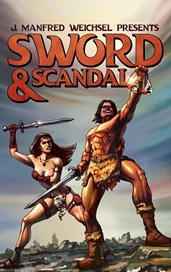Edited by
J. Manfred Weichsel
(Independently Published, November 12, 2024, 198 pp, hc)
“The Gateway of Pleasure” by Jim Lee
“Shaven Beards” by Ross Baxter
“The Snow Princess” by Pip Pinkerton
“Vermina’s Creature” by Bitter Karella
“The Baron with a Thousand Cats” by Gary Every
“Windblades” by C.L. Werner
“Flesh and Ink” by Rebecca Buchanan
“Confessions of a Wicked Harpastum Player” by J. Manfred Weichsel & Alexander Joyner
“Kai-zur the Godless” by David Carter
“Abduction from the Seraglio” David J. West
“The Harem of Al’Azeri” by Jasiah Mike Massa
“He Who Sows” by Austin Worley
Reviewed by Richard Cartwright
This is a crowdfunded anthology that the editor claims is a start at a new genre of fiction that he calls “the Scandal,” which he describes as:
“Sexually explicit, but they are not erotica. They are subversive, without becoming Grimdark. They are bawdy, without being transgressive. They are experimental, but retain the fun of a pulp story. They are modern, but retain the wonder of a weird tale. They incorporate all types of humor; satire, farce, surreal, character driven, and black.”
The result is uneven. It’s not all sword and sandal, nor sword and sorcery. The only common thread is that there’s far more titillation than one finds in most nonerotic anthologies. There’s some good reads in this anthology, but you have to look for them.
Jim Lee takes the damsel in distress trope and places it in a southeastern Asian setting, in “The Gateway of Pleasure.” The tale itself starts out predictably as a knight rescuing a noblewoman taken by bandits. The prose is decidedly on the purple side, probably as an homage to the pulps. However, the twists and turns the story takes make it an enjoyable read.
“Shaven Beards” by Ross Baxter is a quest story where the adventurerers set out to stop a wizard and find and return a wayward child. It’s a generally amusing tale that flips some tropes and is almost a comedy of errors. However, the eroticism of the story feels grafted in, just to satisfy the terms of the anthology. However, the humor is well handled in the story.
Pip Pinkerton’s “The Snow Princess” bills itself as a retelling of Hans Christian Andersen’s the Snow Queen and a parody of Disney’s “Frozen” blended with a healthy dose of porn. The problem with pastiches is sometimes you can go overboard. And unfortunately, that’s what happens here. The author tries to put too many things into the short story, which results in a jumbled read.
“Vermina’s Creature” by Bitter Karella is a horror tale that focuses on the minion of an evil queen. It is very strange and would likely appeal to those who root for the bad guy while enjoying a bit of fem-dom. Not being a fan of horror nor the bad guy not getting their just desserts, it wasn’t for me.
Gary Every explores how tales get taller in the telling in “The Baron with a Thousand Cats.” It’s one of the stories that doesn’t really have any elements of sword and sandal, or sword and sorcery. And it’s not particularly titillating. The tale is somewhat reminiscent of “The Princess Bride” in that it’s a funny story written in a storyteller style. Very enjoyable.
“Windblades” by C.L. Werner is set in feudal Japan during the time of the samurai. This is a well-crafted story with distinct horror elements mixed with themes Kurosawa would have used in “Seven Samurai” along with a relatively happy ending. The horror is more than a little graphic. This is a good story,
Rebrcca Buchanan “Flesh and Ink” is a sword and sorcery story that tells the tale of a warrior woman on a holy quest that she wasn’t particularly desirous of taking. There’s an interesting twist that you don’t see coming. The only real criticism of the story is that it doesn’t resolve some minor points hinted at about the main character. That aside, it’s one of the best of the anthology.
“Confessions of a Wicked Harpastum Player” by J Manfred Weischsel & Alexander Joyner is somewhat unique for anthologies that one of the Kickstarter backers designed the short story for the editor to write. The story is reminiscent of the Spanish Inquisition crossed with the Salem witch trials. The reader can see what’s going to happen early on, but the story is well-crafted enough to carry the reader through to the end.
David Carter’s “Kai-zur the Godless” was described by the editor as the author’s second sale. It’s a splendid effort. A hero returned from war finds his love in a settlement amongst a group of women who are not all that they seem. The style is classic sword and sorcery. The tendency to purple prose makes it a little too classic. That said, it’s well laid out and interesting.
“Abduction from the Seraglio” by David J. West is another classic sword and sorcery tale in which our hero successfully completes his task only to find that the prize he obtained was not the right damsel. What is a hero to do? Go back and do it all over again. The reader learns quickly exactly how the case of mistaken identity took place. It’s a good story that has its humorous moments.
“The Harem of Al’Azeri” by Jasiah Witkofsky recounts the misadventures of our hero who just wanted a nice night on the town. The Middle Eastern setting reminiscent of the Arabian Nights, coupled with the humor, makes it enjoyable to read.
Austin Worley in “He Who Sows” bookends the anthology and is a humorous heist story in which the protagonists have to steal a sacred object in the middle of a Saturnalia like orgy. Our heroines have to stretch in numerous ways to escape with their prize. There’s more than a few chuckles in this story, although it is probably the most sexually explicit of all the stories in the anthology.
 Sword & Scandal
Sword & Scandal